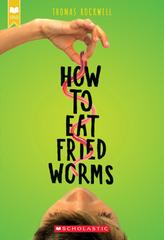 Thomas Rockwell, "who grew up as a character in the illustrations that his father, Norman Rockwell, created for the Saturday Evening Post and later became a successful author of children's books, including How to Eat Fried Worms, a gross-out novel devoured by millions of grade-school students," died September 27 at age 91, the New York Times reported.
Thomas Rockwell, "who grew up as a character in the illustrations that his father, Norman Rockwell, created for the Saturday Evening Post and later became a successful author of children's books, including How to Eat Fried Worms, a gross-out novel devoured by millions of grade-school students," died September 27 at age 91, the New York Times reported.
Rockwell appeared in several of his father's works: as a mischievous boy sitting at his sister's dressing table and reading her diary; flexing his not-very-big muscles in a mirror, a dog at his side; and as a high school graduate, in cap and gown, clutching a rolled-up diploma. One of his favorite memories was posing for a painting that depicted him rummaging through his grandfather's overcoat pocket.
Norman Rockwell wanted his children to become artists, even though he sometimes said otherwise. "He'd say he wanted us to go into business so that we could support him in his old age while he sat outside on the porch," Thomas Rockwell told Education Update in 2003. "But the truth is that my father couldn't understand why anybody would want to be anything else but an artist."
In his 20s, Rockwell owned a used-book store and harbored hopes of making a living as a writer when his father asked him to help write his autobiography, My Adventures as an Illustrator, which was published in 1960.
Two books followed, both written for children and adolescents: Rackety-Bang and Other Verses, a book of poetry, and Squawwwk!, a fantastical novel about a bird that hatches from a schoolbook and grows "as big as Yankee Stadium."
Although those books had only modest sales, that would soon change. In the early 1970s, Rockwell met with an editor in Manhattan about a manuscript he had sent her. "She hadn't liked the manuscript at all," he said in the book How Writers Write (1992), a collection of author interviews by Pamela Lloyd. "She picked out one page and thought that was good and suggested I write something less fanciful, maybe more realistic."
On the drive home, "I was really feeling terrible that my manuscript had been rejected. I felt as if I had been eating worms," he said, then recalled an old children's tune--"Nobody loves me, everybody hates me, I think I'll go eat worms"--and an idea popped up. "Then came the difficult part: Why is somebody going to eat worms? And even before I got home, I thought: 'Well, make it a bet.' "
How to Eat Fried Worms (1973) tells the story of two elementary-school boys, Billy and Alan. Billy is new in school and just wants to fit in. Alan is a bully. The boys make a bet: If Billy eats 15 worms in 15 days, Alan will give him $50; if Billy doesn't, he will give Alan $50.
Children, especially reluctant-to-read boys, loved the book. More than three million copies have been sold, and it was adapted into a film in 2006.
Rockwell's mother, Mary (Barstow) Rockwell, was a teacher and aspiring poet who shared her work with her husband but never published. Rockwell credited his mother, who had a large collection of children's books, with inspiring him to become a writer.
Rockwell went on to publish more than a dozen other children's books, including The Neon Motorcycle, How to Fight a Girl, and How to Get Fabulously Rich. He also directed the Norman Rockwell Family Agency, which licenses his father's works.
How to Eat Fried Worms was rejected by more than 20 editors. Children's book editor Richard Jackson, who passed on the book when he was at Bradbury Press, told School Library Journal: "I knew kids would love it. But I couldn't bear to read about those worms over and over again."
Rockwell agreed. "When I finished the book, I said to myself, 'If a publisher takes it, then I'll eat a worm,' " he said in an interview. "But I just never found the time."

